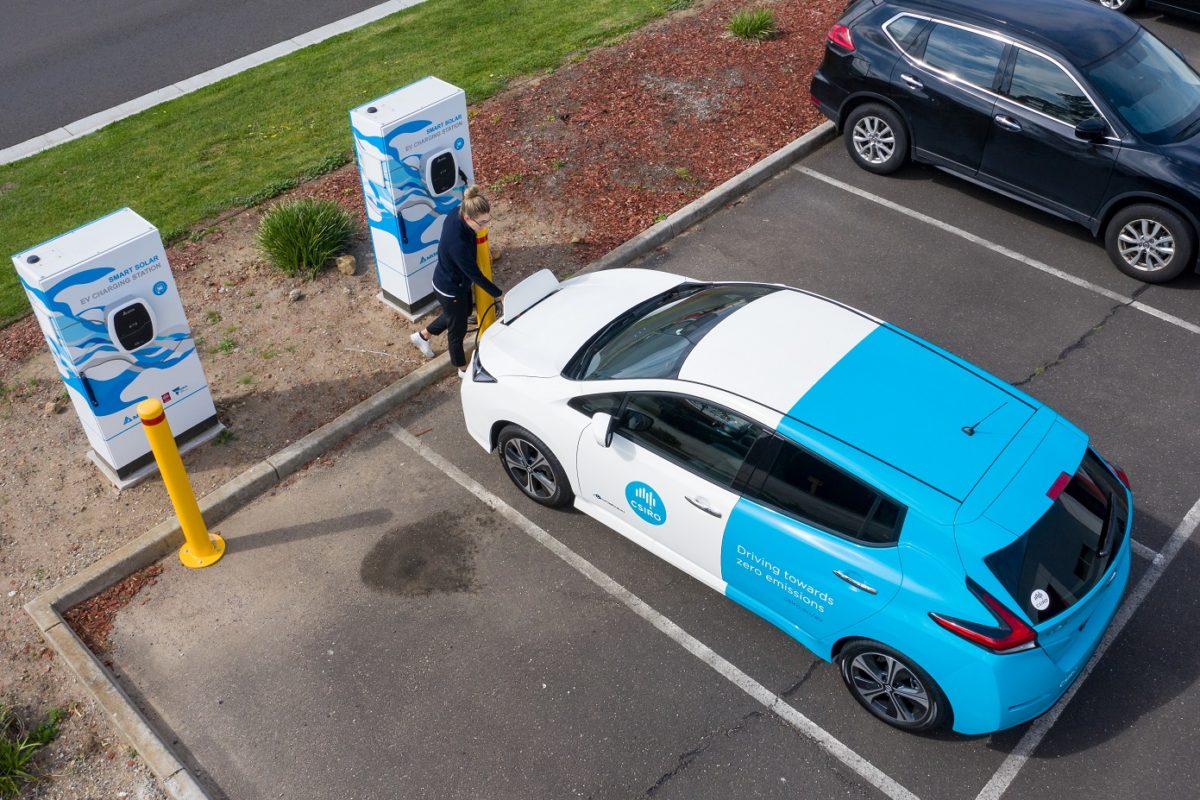Amid the accelerating uptake of EVs in Australia, demand for infrastructure is growing and placing stress on grid-powered charging stations. In a bid to ensure the amount of power required from the grid is minimized, Australia’s national science agency, CSIRO, has devised a solar-powered EV charging technology which is compatible with all EVs currently on the market and able to efficiently manage the temperature of the battery.
The new solar-powered EV charging technology seeks to overcome challenges, such as managing temperatures on even the hottest days, and to alleviate stress on the grid during peak periods, maximizing the use of on-site PV. CSIRO researchers developed and tested the system, incorporating a range of heat management strategies to ensure batteries are charged and discharged efficiently.
With up to 90% of EV charging likely to take place in the home, according to lead researcher from CSIRO’s Centre for Hybrid Energy Systems Christopher Munnings, the technology was developed with the Australian household in mind. “A normal household battery system is typically not powerful enough to charge a car on a hot day as it can overheat and slow down,” Munnings said. “We’ve devised a way to manage the temperature of the battery, minimising the amount of power required from the grid.”
Funded by the Victorian Government and in collaboration with Delta Electronics and Nissan Australia, the technology also supports charging of multiple vehicles in areas with limited access to grid power – such as home garages and public carparks – where the charge rate would otherwise be limited.”In a multi-EV home, this system will automatically monitor each car, spreading the load between the battery, solar PV and the rest of the home,” Munnings said. “This means the cars charge as quickly as possible, using as much sun as possible, without the need to upgrade grid connection. This technology could accelerate the widespread rollout of EVs across the country.”
While CSIRO focused on the module that integrates with solar and battery systems to help charge multiple vehicles quickly, regardless of the weather, Delta Electronics developed the cabinets that combine a solar system with battery storage and EV charging. Delta has received $210,000 from the Victoria Government’s New Energy Jobs Fund to help further test and fine-tune the charging systems in real-world applications. Important infrastructure for the research has been installed at Nissan Headquarters in Dandenong including a 5kW solar system to power the two solar charging units at the front of Nissan Australian’s head office, and another two charging units connected to a 10kW solar system positioned at the rear of the property.
The solar charging modules at Nissan Headquarters are each capable of charging four vehicles. They will be tested and evaluated over 200 days, including the peak summer period. “Nissan is proud to partner with CSIRO and Delta Electronics to deliver this innovative trial and acknowledges the investment of the Victorian Government in supporting this project,” Nissan Australia Managing Director Stephen Lester said. “A study of this nature will enable greater EV adoption both here and around the world reducing impact on the grid.”
The technology will test both fast and slow charging scenarios relevant to a range of Australian electricity grid and environmental conditions, particularly in regional and rural areas. Once the full study is complete, it could pave the way to have solar-powered chargers installed without requiring updates to grid connections, and in areas that do not have access to grid power.
With transport set to continue as one of Australia’s biggest emitters, Minister for Energy, Environment and Climate Change Lily D’Ambrosio, welcomed the project as an important step towards emissions reduction. “We know we need to reduce emissions in the transport sector and one of the best ways we can do that is to support partnerships like this one,” she said. “This battery smart storage platform means electric vehicle drivers can travel more confidently and enjoy the drive.”
This content is protected by copyright and may not be reused. If you want to cooperate with us and would like to reuse some of our content, please contact: editors@pv-magazine.com.









By submitting this form you agree to pv magazine using your data for the purposes of publishing your comment.
Your personal data will only be disclosed or otherwise transmitted to third parties for the purposes of spam filtering or if this is necessary for technical maintenance of the website. Any other transfer to third parties will not take place unless this is justified on the basis of applicable data protection regulations or if pv magazine is legally obliged to do so.
You may revoke this consent at any time with effect for the future, in which case your personal data will be deleted immediately. Otherwise, your data will be deleted if pv magazine has processed your request or the purpose of data storage is fulfilled.
Further information on data privacy can be found in our Data Protection Policy.